外研版必修5 Module 1 British and American English Vocabulary, Grammar, Function课件(63张ppt)
文档属性
| 名称 | 外研版必修5 Module 1 British and American English Vocabulary, Grammar, Function课件(63张ppt) |
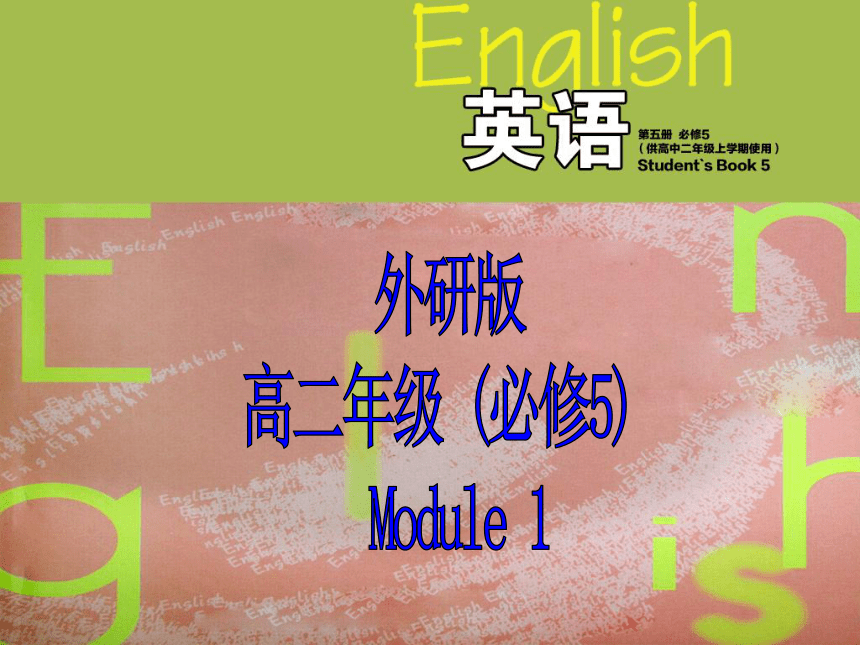
|
|
| 格式 | zip | ||
| 文件大小 | 2.5MB | ||
| 资源类型 | 教案 | ||
| 版本资源 | 外研版 | ||
| 科目 | 英语 | ||
| 更新时间 | 2022-02-11 00:00:00 | ||
图片预览




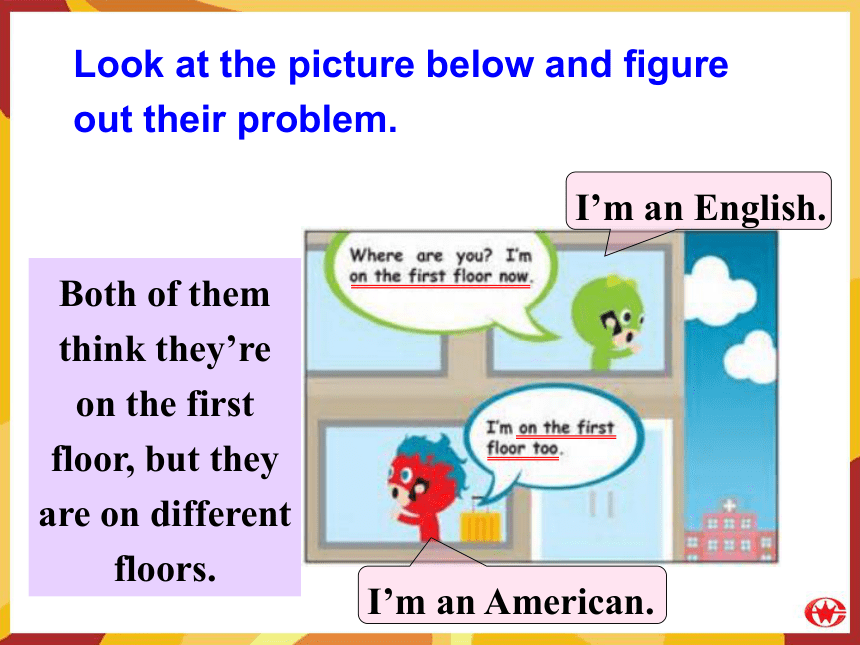
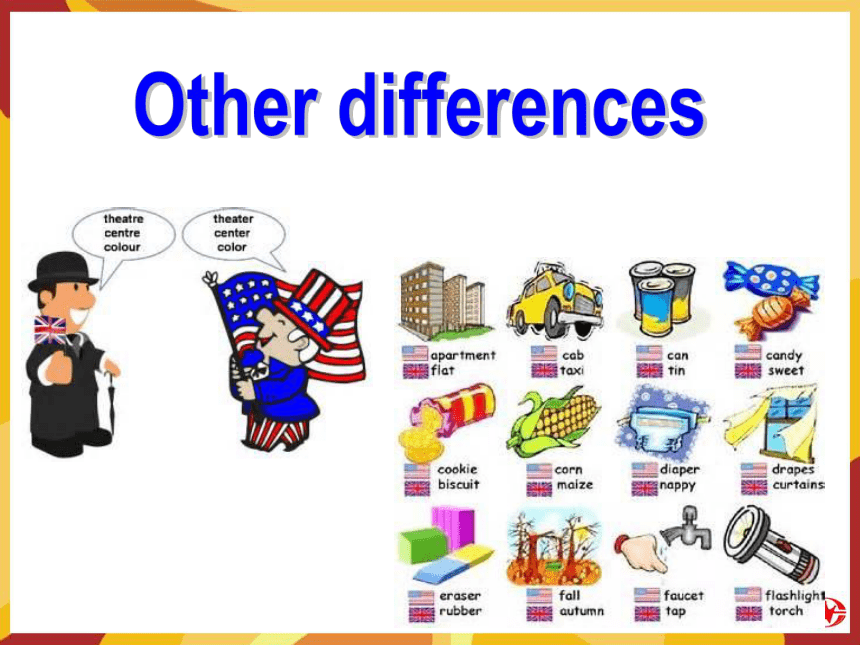
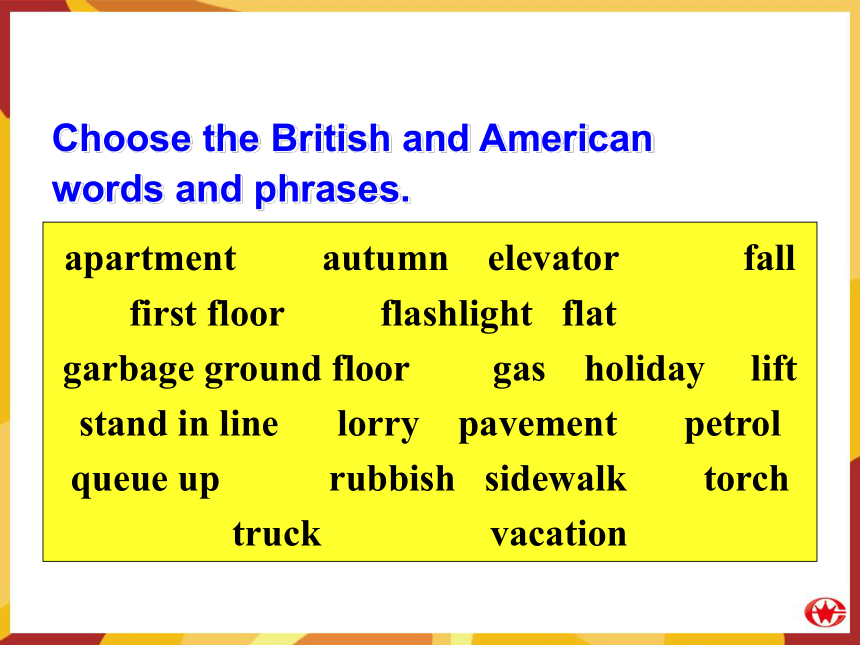
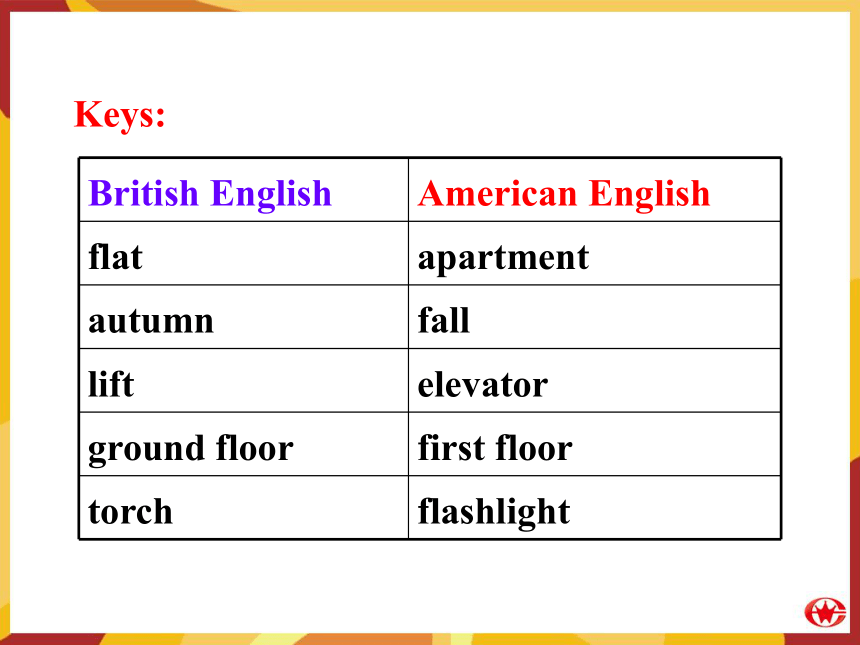
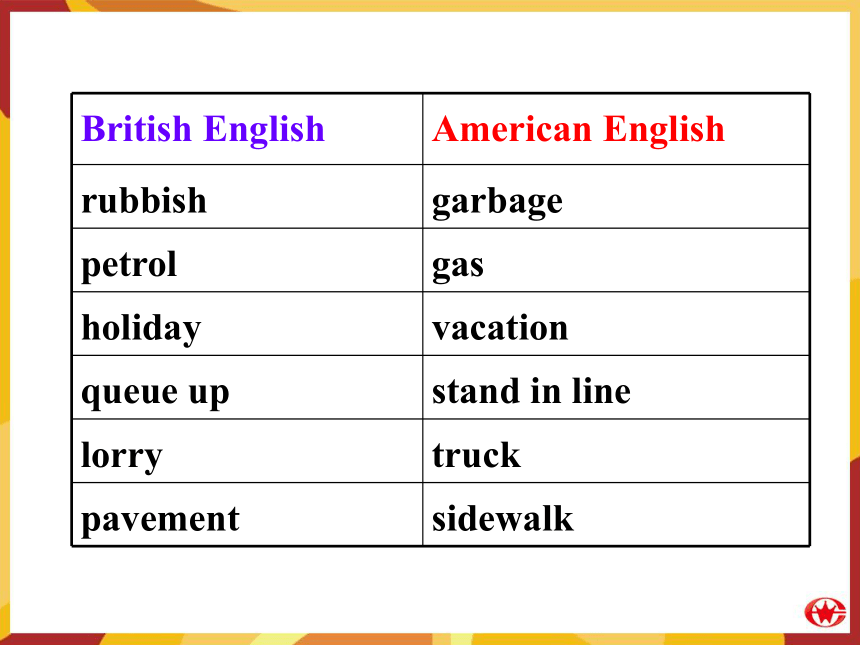
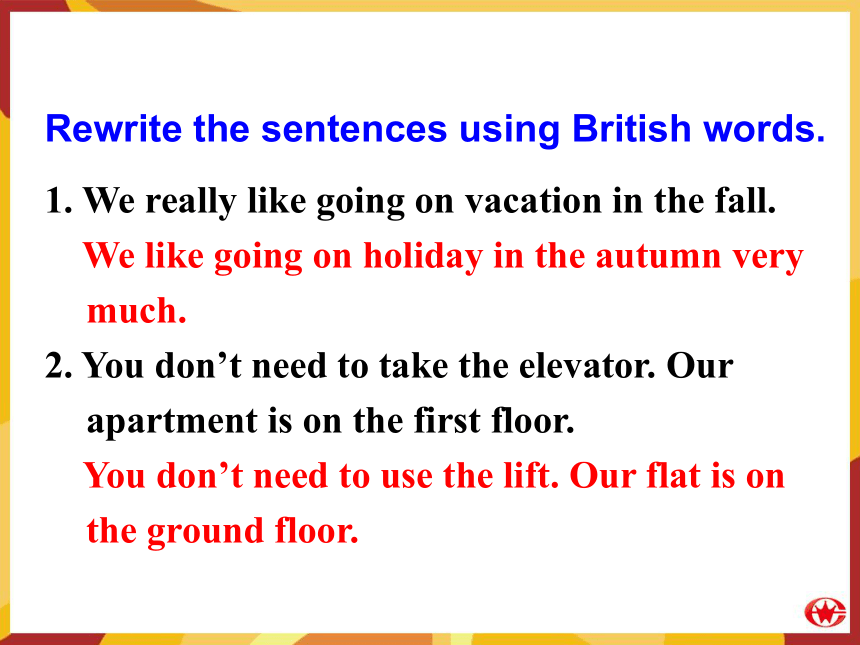


文档简介
(共63张PPT)
1. Review of verb forms
2. To review the use of the present simple tense, the present continuous tense, the present perfect tense and the future simple tense
3. To review the use of for or since with present perfect tense
Both of them think they’re on the first floor, but they are on different floors.
I’m an American.
I’m an English.
Look at the picture below and figure out their problem.
Choose the British and American words and phrases.
apartment autumn elevator fall
first floor flashlight flat garbage ground floor gas holiday lift
stand in line lorry pavement petrol queue up rubbish sidewalk torch
truck vacation
British English American English
flat apartment
autumn fall
lift elevator
ground floor first floor
torch flashlight
Keys:
British English American English
rubbish garbage
petrol gas
holiday vacation
queue up stand in line
lorry truck
pavement sidewalk
Rewrite the sentences using British words.
1. We really like going on vacation in the fall.
We like going on holiday in the autumn very much.
2. You don’t need to take the elevator. Our apartment is on the first floor.
You don’t need to use the lift. Our flat is on the ground floor.
3. Did you see that truck come out of the gas
station
Did you see that lorry come out of the petrol
station
4. Pass me a flashlight, Eddie. I’ve lost my
wallet.
Pass me a torch, Eddie. I’ve lost my wallet.
Complete the sentences with the correct form of the verbs.
All languages ______ over a period of time.
English ___________ very rapidly.
How many people ______ Chinese
I __________ American English is very different from British English.
change develop speak think watch grow study
change
is developing
speak
don’t think
5. Millions of people ______ satellite TV
every day.
6. The percentage of non-English web
pages __________.
7. What languages ______ people ______ in
China
8. What ______ you _______ this year
watch
is growing
do
study
are
studying
change develop speak think watch grow study
一、一般现在时
1. 表示习惯性的动作,常与always, never, every day, often, sometimes等连用。
e.g. The postman always _____ (call) at
7:30.
calls
2. 表示主语的特征、性格或能力。
e.g. Ellen is an honest girl, and you can
trust her.
Jack ________ (write) good English
but does not speak well.
writes
3. 表示不受时间限制的客观存在,如客观真理、格言、科学事实等。
e.g. Facts speak louder than words.
Food easily _____ (go) bad in hot
weather.
goes
4. 在时间和条件状语从句中代替一般将来时。
e.g. Where will you stay when you get to
San Francisco
I’ll pay you double if you finish the
work by Friday.
5. 表示按规定、计划、安排发生的动作,常用动词有go, come, arrive, leave, start等。
e.g. The flight for Shanghai
________ (leave) at 8:30 tomorrow
morning.
leaves
(1) People _______ (have) better access to
health care than they used to, and they’re
living longer as a result.
(2017 北京)
(2) He’s been informed that he
_____________ (not qualify) for the
scholarship because of his academic
background. (2017 江苏)
have
doesn’t qualify
二、现在进行时 (构成形式为:am / is / are+动词-ing形式)
1. 表示说话时正在进行的动作或发生的事。
e.g. The children ___________ (make) a
snowman in the yard now.
are making
2. 表示现阶段正在发生的事,此刻不一定在进行。常用的时间状语有these days, this week, at present等。
e.g. We ______________ for the coming
exam these days.
我们这些天正在为即将到来的考试
做准备。
are preparing
3. 表示一个按计划即将发生的动作,所用动词多是转移动词,如arrive, come, go, leave, return等。
e.g. The headmaster ______________
Beijing this weekend.
校长这星期要离开去北京了。
is leaving for
4. 表示经常性的动作,常与always, forever等连用,表示赞叹、厌烦等情绪。
e.g. David is always helping others.
Why are you forever
asking questions
My washing machine _______________
(repair) this week, so I have to wash my
clothes by hand.
(2018 天津)
is being repaired
三、一般将来时
其构成形式之一为:shall(第一人称)/ will(所有人称)+动词原形,表示将要发生的事,但这种将来意义常带有说话人的主观态度和看法。
e.g. You _________ (feel) better after taking
this medicine.
This time next week I shall / will be in
Scotland.
will feel
另一种构成形式为:be (am / is / are) going to +动词原形
1. 表示“意图”,即打算将来做某事。
e.g. Are you going to post that letter by
airmail
2. 表示“预见”,即现在已有的迹象表明将要发
生某种情况。
e.g. Look! Here come the dark clouds.
_________________. 就要下雨了。
It is going to rain
The students have been working hard
on their lessons and their efforts
_______________ (reward) success in the end.
(2016北京卷)
will be rewarded
四、现在完成时 (构成形式为:have /
has +动词-ed形式)
1. 表示过去发生的动作对现在有影响,常与already, yet, never, recently, ever等连用。
e.g. They __________ (spend) nearly a
billion dollars on it already.
have spent
2. 表示过去已经开始,持续到现在(可能还会继续下去)的动作或状态,常与since, “for +一段时间”, so far, in recent years等连用。
e.g. I ____________ Joanna since she
was in the kindergarten.
从乔安娜上幼儿园起我就认识她了。
have known
3. 在时间和条件状语从句中,表示将来某时已经完成的动作。
e.g. Frank will return me the book if
he has finished reading it.
China's high-speed railways ___________ (grow) from 9,000 to 25,000 kilometers in the past few years.
(2018 北京)
have grown
用括号内所给动词的正确形式完成对话。
Eve: I ________ (smell) something burning!
Carl: So ______ (do) I. Probably Ann __________ (iron) upstairs. She usually ________ (iron) while watching TV, and if she ______ (get) very interested in a program she will forget that she __________ (press) a hot iron on to her clothes.
smell
do
is ironing
irons
gets
is pressing
Eve: That’s too dangerous. ______ she ever ________ (burn) herself
Carl: Yes. Last month she burnt her fingers.
Eve: That’s too bad. I ________ (go) to ask her to switch the TV off now.
Has
burnt
will go
Translate the following sentences.
1. 我们见面时我会和你讨论此事。
2. 对不起, 你不能把这本字典拿走。我
正在用它。
I’ll discuss this matter with you when we meet.
Sorry, you can’t take the dictionary away. I’m using it.
3. 当我完成这本书的时候我会给你信。
I’ll write to you when I have finished the book.
Complete the sentences with since and for.
1. English grammar has not changed much ____ the time of Shakespeare.
2. The American spelling system has existed ____ about 200 years.
3. I have been studying English ____ I was in primary school.
since
since
for
4. We have an American teacher. He has been here ____ January.
5. CNN has been on the air ____ more than 20 years.
6. Monita Rajpal has worked for CNN ____ the year 2000.
since
for
since
一、现在完成时既可以与since引导的时间状语
从句连用,又可以与since构成的短语连
用。
1. since作连词,后跟句子,它所表示的时间是“从某一点开始”。若从句谓语为终止性动词,主句的时间则从这一“时刻”算起。
e.g. He has lived here since he lefts Shanghai.
since和for
若从句为延续性或状态性动词,则从其动作结束“那点”算起。
e.g. It is six years since he was a teacher.
I haven’t heard from her since she
lived there.
2. since作介词,后跟表示时间的名词,必须是表示“时间的一点”,不能表示时间的一段。
e.g. He has taught at this school since 1965.
二、现在完成时与介词for构成的短语连用。
1. 介词for构成的短语,表示时间的长度,
后跟一段时间,不能跟时间的一点。
e.g. We have studied English for two years.
They have known each other for five years.
2. 终止性动词不能与表示一段时间的介词for连用,但它的否定式可与介词for连用。
e.g. I have not received his letter for two
months.
He has had the dictionary for two
weeks. (buy用have代替)
My father has been in the Party for
ten years. (join用be in)
1. I like Leeds because there’s more going on here than back home in the States.
2. Since English is spoken all over the world, there are lots of varieties.
Underline the words which introduce
reason.
3. As I was the only British person in the
school, they made a fuss of me.
4. I’m getting on just fine, now that I
understand the local accent.
1) because语势最强, 用来说明人所不知的原因, 回答why提出的问题, 是句子中的重要部分, 常在句末, 不能用其它三个替换。逗号可加可不加。
e.g. I haven’t been to the cinema lately,
because I am too busy.
我近来没有去看电影因为太忙了。
1. because, since, as, for 辨析
2) 当原因是显而易见的或已为人们所知, 就用as或 since。since稍正式一些。
e.g. Since /As the weather is so bad, we
have to delay our journey.
既然天气这么糟,我们不得不推
迟旅行。
3) 由because引导的从句如果放在句末, 且前面有逗号, 则可以用for来代替。但如果不是说明直接原因, 而是多种情况加以推断, 就只能用for。
e.g. He is absent today, because/for he is ill.
他今天没来,因为他病了。
He must be ill, for he is absent today.
他肯定是病了,因为他今天没来。
4) 当because引导的从句与否定的主句连用, 而主句又位于句首时, 之前不用逗号, 因为主句动词否定的是其后的全部内容。为了突出because从句, because前常加上副词, 如: just, only, simply, chiefly等。
e.g. You should not despise a man
just because he is poorly dressed.
你不应该因为一个人衣着寒酸就鄙视他。
2. now that 既然,因为,由于
e.g. Now that I am free, I can enjoy
music for a while.
既然有空,我可以享受一下音乐。
The days are closing in now that it
is autumn. 由于已是秋天,白昼越来越短了。
Which word do we use more often to introduce a reason
Which expression shows that a situation has changed
3. Which two words often come at the beginning of a sentence
because
now that
since and as
Answer the questions.
Complete the sentences with because, since/as or now that.
1. It is useful to learn English _________ it is spoken all over the world.
2. ________ they see lots of American films, the British are used to American accents.
because/as
Since/As
3. Americans like the British accent _______ they think it is cute.
4. It’s easier to compare British and American English ________ we have the Internet.
because
now that
复习下列时态:
1. 一般现在时
The Present Simple Tense
2. 现在进行时
The Present Continuous Tense
3. 一般将来时
The Future Simple Tense
4. 现在完成时
The Present Perfect Tense
选用括号内合适的内容完成下面对话。
Megan meets her friend Jess in a café.
Megan: Hi, Jess, how are you I 1. _________
(haven't seen / haven't been seeing)
you since the summer.
Jess: No, I 2. ________ (have been revising /
have revised) for my exams. They're
next week. What about you
Megan: Well, a few days ago I met a website
designer, Steve, who 3. ________ (is
looking / has been looking) for some
help for weeks. He 4. ________ (offers
/ has offered) me some work from
next week.
Jess: That's great.
Megan: Yeah, and every day since then I 5.
________ (look / have been looking) at
his sites. He 6. ________ (has designed
/ has been designing) three or four
really cool ones already. But he 7.
________ (doesn't have / isn't having)
enough time to do all the new ones.
That's why he 8. ________ (is needing /
needs) me.
Jess: That's really good. Hey, who's that guy
over there He 9. ________ (has looked /
has been looking) at us since we met.
Megan: Oh, wow, that's Steve, the guy I 10.
________ (have been telling / tell) you
about.
Jess: He 11. ________ (is looking / looks) like a
student or something.
Megan: Shh. He 12. ________ (is coming / comes)
over.
Steve: Hi, Megan.
Megan: Steve, this is my friend Jess.
Steve: Hello. 13. ________ (Do you use / Are
you using) the Wi-Fi in here at the
moment
Jess: Yes. I 14. ________ (come / am coming)
here most days for lunch and since the
café's got Wi-Fi I 15. ________ (have
checked / have been checking) my
email at the same time.
Steve: And 16. ________ (do you enjoy / are
you enjoying) the food here
Jess: Er, yes. It's always very good. But why
Steve: Oh, just interested. I 17. ________ (own
/ am owning) this café.
Do exercises 1-4 on page 67.
1. Review of verb forms
2. To review the use of the present simple tense, the present continuous tense, the present perfect tense and the future simple tense
3. To review the use of for or since with present perfect tense
Both of them think they’re on the first floor, but they are on different floors.
I’m an American.
I’m an English.
Look at the picture below and figure out their problem.
Choose the British and American words and phrases.
apartment autumn elevator fall
first floor flashlight flat garbage ground floor gas holiday lift
stand in line lorry pavement petrol queue up rubbish sidewalk torch
truck vacation
British English American English
flat apartment
autumn fall
lift elevator
ground floor first floor
torch flashlight
Keys:
British English American English
rubbish garbage
petrol gas
holiday vacation
queue up stand in line
lorry truck
pavement sidewalk
Rewrite the sentences using British words.
1. We really like going on vacation in the fall.
We like going on holiday in the autumn very much.
2. You don’t need to take the elevator. Our apartment is on the first floor.
You don’t need to use the lift. Our flat is on the ground floor.
3. Did you see that truck come out of the gas
station
Did you see that lorry come out of the petrol
station
4. Pass me a flashlight, Eddie. I’ve lost my
wallet.
Pass me a torch, Eddie. I’ve lost my wallet.
Complete the sentences with the correct form of the verbs.
All languages ______ over a period of time.
English ___________ very rapidly.
How many people ______ Chinese
I __________ American English is very different from British English.
change develop speak think watch grow study
change
is developing
speak
don’t think
5. Millions of people ______ satellite TV
every day.
6. The percentage of non-English web
pages __________.
7. What languages ______ people ______ in
China
8. What ______ you _______ this year
watch
is growing
do
study
are
studying
change develop speak think watch grow study
一、一般现在时
1. 表示习惯性的动作,常与always, never, every day, often, sometimes等连用。
e.g. The postman always _____ (call) at
7:30.
calls
2. 表示主语的特征、性格或能力。
e.g. Ellen is an honest girl, and you can
trust her.
Jack ________ (write) good English
but does not speak well.
writes
3. 表示不受时间限制的客观存在,如客观真理、格言、科学事实等。
e.g. Facts speak louder than words.
Food easily _____ (go) bad in hot
weather.
goes
4. 在时间和条件状语从句中代替一般将来时。
e.g. Where will you stay when you get to
San Francisco
I’ll pay you double if you finish the
work by Friday.
5. 表示按规定、计划、安排发生的动作,常用动词有go, come, arrive, leave, start等。
e.g. The flight for Shanghai
________ (leave) at 8:30 tomorrow
morning.
leaves
(1) People _______ (have) better access to
health care than they used to, and they’re
living longer as a result.
(2017 北京)
(2) He’s been informed that he
_____________ (not qualify) for the
scholarship because of his academic
background. (2017 江苏)
have
doesn’t qualify
二、现在进行时 (构成形式为:am / is / are+动词-ing形式)
1. 表示说话时正在进行的动作或发生的事。
e.g. The children ___________ (make) a
snowman in the yard now.
are making
2. 表示现阶段正在发生的事,此刻不一定在进行。常用的时间状语有these days, this week, at present等。
e.g. We ______________ for the coming
exam these days.
我们这些天正在为即将到来的考试
做准备。
are preparing
3. 表示一个按计划即将发生的动作,所用动词多是转移动词,如arrive, come, go, leave, return等。
e.g. The headmaster ______________
Beijing this weekend.
校长这星期要离开去北京了。
is leaving for
4. 表示经常性的动作,常与always, forever等连用,表示赞叹、厌烦等情绪。
e.g. David is always helping others.
Why are you forever
asking questions
My washing machine _______________
(repair) this week, so I have to wash my
clothes by hand.
(2018 天津)
is being repaired
三、一般将来时
其构成形式之一为:shall(第一人称)/ will(所有人称)+动词原形,表示将要发生的事,但这种将来意义常带有说话人的主观态度和看法。
e.g. You _________ (feel) better after taking
this medicine.
This time next week I shall / will be in
Scotland.
will feel
另一种构成形式为:be (am / is / are) going to +动词原形
1. 表示“意图”,即打算将来做某事。
e.g. Are you going to post that letter by
airmail
2. 表示“预见”,即现在已有的迹象表明将要发
生某种情况。
e.g. Look! Here come the dark clouds.
_________________. 就要下雨了。
It is going to rain
The students have been working hard
on their lessons and their efforts
_______________ (reward) success in the end.
(2016北京卷)
will be rewarded
四、现在完成时 (构成形式为:have /
has +动词-ed形式)
1. 表示过去发生的动作对现在有影响,常与already, yet, never, recently, ever等连用。
e.g. They __________ (spend) nearly a
billion dollars on it already.
have spent
2. 表示过去已经开始,持续到现在(可能还会继续下去)的动作或状态,常与since, “for +一段时间”, so far, in recent years等连用。
e.g. I ____________ Joanna since she
was in the kindergarten.
从乔安娜上幼儿园起我就认识她了。
have known
3. 在时间和条件状语从句中,表示将来某时已经完成的动作。
e.g. Frank will return me the book if
he has finished reading it.
China's high-speed railways ___________ (grow) from 9,000 to 25,000 kilometers in the past few years.
(2018 北京)
have grown
用括号内所给动词的正确形式完成对话。
Eve: I ________ (smell) something burning!
Carl: So ______ (do) I. Probably Ann __________ (iron) upstairs. She usually ________ (iron) while watching TV, and if she ______ (get) very interested in a program she will forget that she __________ (press) a hot iron on to her clothes.
smell
do
is ironing
irons
gets
is pressing
Eve: That’s too dangerous. ______ she ever ________ (burn) herself
Carl: Yes. Last month she burnt her fingers.
Eve: That’s too bad. I ________ (go) to ask her to switch the TV off now.
Has
burnt
will go
Translate the following sentences.
1. 我们见面时我会和你讨论此事。
2. 对不起, 你不能把这本字典拿走。我
正在用它。
I’ll discuss this matter with you when we meet.
Sorry, you can’t take the dictionary away. I’m using it.
3. 当我完成这本书的时候我会给你信。
I’ll write to you when I have finished the book.
Complete the sentences with since and for.
1. English grammar has not changed much ____ the time of Shakespeare.
2. The American spelling system has existed ____ about 200 years.
3. I have been studying English ____ I was in primary school.
since
since
for
4. We have an American teacher. He has been here ____ January.
5. CNN has been on the air ____ more than 20 years.
6. Monita Rajpal has worked for CNN ____ the year 2000.
since
for
since
一、现在完成时既可以与since引导的时间状语
从句连用,又可以与since构成的短语连
用。
1. since作连词,后跟句子,它所表示的时间是“从某一点开始”。若从句谓语为终止性动词,主句的时间则从这一“时刻”算起。
e.g. He has lived here since he lefts Shanghai.
since和for
若从句为延续性或状态性动词,则从其动作结束“那点”算起。
e.g. It is six years since he was a teacher.
I haven’t heard from her since she
lived there.
2. since作介词,后跟表示时间的名词,必须是表示“时间的一点”,不能表示时间的一段。
e.g. He has taught at this school since 1965.
二、现在完成时与介词for构成的短语连用。
1. 介词for构成的短语,表示时间的长度,
后跟一段时间,不能跟时间的一点。
e.g. We have studied English for two years.
They have known each other for five years.
2. 终止性动词不能与表示一段时间的介词for连用,但它的否定式可与介词for连用。
e.g. I have not received his letter for two
months.
He has had the dictionary for two
weeks. (buy用have代替)
My father has been in the Party for
ten years. (join用be in)
1. I like Leeds because there’s more going on here than back home in the States.
2. Since English is spoken all over the world, there are lots of varieties.
Underline the words which introduce
reason.
3. As I was the only British person in the
school, they made a fuss of me.
4. I’m getting on just fine, now that I
understand the local accent.
1) because语势最强, 用来说明人所不知的原因, 回答why提出的问题, 是句子中的重要部分, 常在句末, 不能用其它三个替换。逗号可加可不加。
e.g. I haven’t been to the cinema lately,
because I am too busy.
我近来没有去看电影因为太忙了。
1. because, since, as, for 辨析
2) 当原因是显而易见的或已为人们所知, 就用as或 since。since稍正式一些。
e.g. Since /As the weather is so bad, we
have to delay our journey.
既然天气这么糟,我们不得不推
迟旅行。
3) 由because引导的从句如果放在句末, 且前面有逗号, 则可以用for来代替。但如果不是说明直接原因, 而是多种情况加以推断, 就只能用for。
e.g. He is absent today, because/for he is ill.
他今天没来,因为他病了。
He must be ill, for he is absent today.
他肯定是病了,因为他今天没来。
4) 当because引导的从句与否定的主句连用, 而主句又位于句首时, 之前不用逗号, 因为主句动词否定的是其后的全部内容。为了突出because从句, because前常加上副词, 如: just, only, simply, chiefly等。
e.g. You should not despise a man
just because he is poorly dressed.
你不应该因为一个人衣着寒酸就鄙视他。
2. now that 既然,因为,由于
e.g. Now that I am free, I can enjoy
music for a while.
既然有空,我可以享受一下音乐。
The days are closing in now that it
is autumn. 由于已是秋天,白昼越来越短了。
Which word do we use more often to introduce a reason
Which expression shows that a situation has changed
3. Which two words often come at the beginning of a sentence
because
now that
since and as
Answer the questions.
Complete the sentences with because, since/as or now that.
1. It is useful to learn English _________ it is spoken all over the world.
2. ________ they see lots of American films, the British are used to American accents.
because/as
Since/As
3. Americans like the British accent _______ they think it is cute.
4. It’s easier to compare British and American English ________ we have the Internet.
because
now that
复习下列时态:
1. 一般现在时
The Present Simple Tense
2. 现在进行时
The Present Continuous Tense
3. 一般将来时
The Future Simple Tense
4. 现在完成时
The Present Perfect Tense
选用括号内合适的内容完成下面对话。
Megan meets her friend Jess in a café.
Megan: Hi, Jess, how are you I 1. _________
(haven't seen / haven't been seeing)
you since the summer.
Jess: No, I 2. ________ (have been revising /
have revised) for my exams. They're
next week. What about you
Megan: Well, a few days ago I met a website
designer, Steve, who 3. ________ (is
looking / has been looking) for some
help for weeks. He 4. ________ (offers
/ has offered) me some work from
next week.
Jess: That's great.
Megan: Yeah, and every day since then I 5.
________ (look / have been looking) at
his sites. He 6. ________ (has designed
/ has been designing) three or four
really cool ones already. But he 7.
________ (doesn't have / isn't having)
enough time to do all the new ones.
That's why he 8. ________ (is needing /
needs) me.
Jess: That's really good. Hey, who's that guy
over there He 9. ________ (has looked /
has been looking) at us since we met.
Megan: Oh, wow, that's Steve, the guy I 10.
________ (have been telling / tell) you
about.
Jess: He 11. ________ (is looking / looks) like a
student or something.
Megan: Shh. He 12. ________ (is coming / comes)
over.
Steve: Hi, Megan.
Megan: Steve, this is my friend Jess.
Steve: Hello. 13. ________ (Do you use / Are
you using) the Wi-Fi in here at the
moment
Jess: Yes. I 14. ________ (come / am coming)
here most days for lunch and since the
café's got Wi-Fi I 15. ________ (have
checked / have been checking) my
email at the same time.
Steve: And 16. ________ (do you enjoy / are
you enjoying) the food here
Jess: Er, yes. It's always very good. But why
Steve: Oh, just interested. I 17. ________ (own
/ am owning) this café.
Do exercises 1-4 on page 67.
